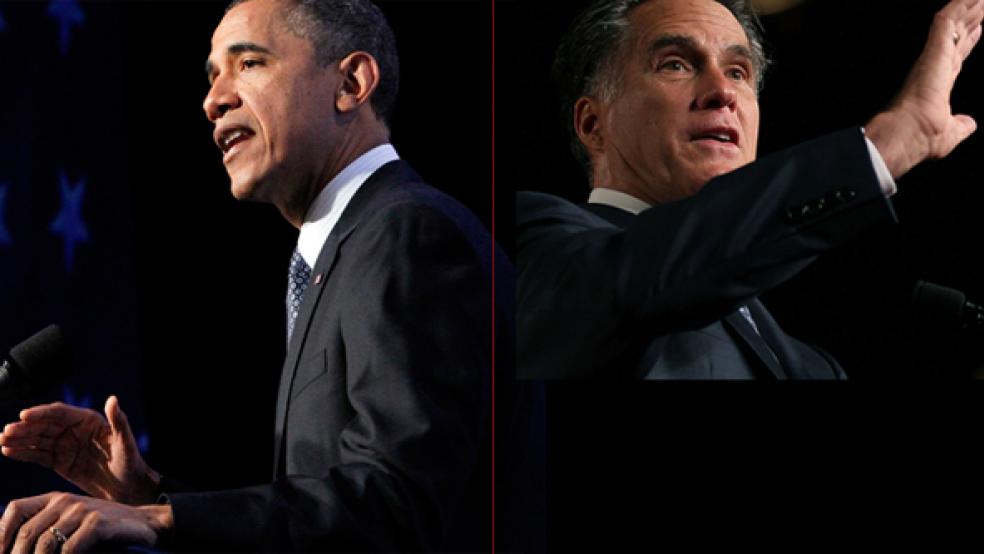It’s a tremendously rare moment in politics when everything and everyone stops for a single event. Wednesday night’s first general election debate between President Obama and former Massachusetts governor Mitt Romney is just such a moment. Think of it like the Super Bowl, but for politics; even if you don’t like the game all that much, you tune in because it’s a cultural happening. (And yes, we are aware that we just called a presidential debate a “cultural happening.”)

“Come Thursday morning, the entire narrative of this race is going to change,” predicted the always-understated New Jersey governor, Chris Christie (R), in an appearance Sunday on NBC’s “Meet the Press.”
We’re not so sure we would go that far, but it is clear that Wednesday’s debate in Denver will have major implications for how the remaining five weeks of the campaign play out.
So, what should we expect out of Obama and Romney on Wednesday night? Here are a few things to watch for:
Obama and the four-corners offense: Remember the days before there was a shot clock in college basketball? The team that led late in the second half just held on to the ball, milking the clock and draining any hope of a comeback from their opponents.
Go back and watch Obama’s debate performance in 2008 against Sen. John McCain (R-Ariz.) and you will see a candidate who knows he’s ahead and just wants to make sure he holds on to the ball.
Try to think of a genuinely memorable moment from the three Obama-McCain debates. You’ll be hard-pressed to do it — and that’s a testament to Obama’s ability to execute his four-corners strategy. He came across as serious and sober about the nation’s problems, but also left almost no opening for McCain to leap in and steal the ball from him.
Expect more of the same Wednesday night — and in the subsequent two debates — from the president. While Obama’s lead is more shaky at this point in 2012 than it was in 2008, the president and his team know they’re ahead and that the burden of proof lies with Romney. Given that reality, don’t expect any risk-taking from the incumbent.
Romney outside his comfort zone: In 95 percent of the debates during the Republican presidential primaries, Romney was the front-runner. That meant that he knew he would be getting the majority of the questions — and critiques. And by and large, Romney handled that role well. He largely ignored his opponents’ barbs and did everything he could to keep the focus on Obama and his handling of the economy.
But that “Romney as front-runner” dynamic won’t be in place Wednesday night. It’s clear that Romney is behind Obama nationally and in key swing states — not so far behind he can’t come back, but behind nonetheless — and therefore needs to be the instigator.
That’s not a role Romney has been comfortable with in past debates. His attempts to go after McCain during the 2008 Republican primary debates often flopped, and Romney seemed uncomfortable playing too much offense in the brief moment when Texas Gov. Rick Perry (R) looked liked the 2012 front-runner.
The Romney team has to hope that its candidate’s seeming aversion to being the aggressor in a debate will disappear when he is facing a Democrat rather than a member of his own party on the stage.
The one-on-one dynamic: In “The Princess Bride,” one of the Fix’s all-time favorite movies, Andre the Giant plays a henchman named Fezzik. When faced with fighting a single person after years of battling groups of men all at once (he was Andre the Giant, after all), Fezzik struggles. “You use different moves when you’re fighting half a dozen people than when you only have to be worried about one,” he explains.
Romney has spent his entire debate life — in his career as a national politician — on stage with a group of people, most of whom were trying to gang up on him. Obama’s most recent debate experience, on the other hand, comes from his three general election debates against McCain and, before that, a one-on-one debate with Sen. Hillary Rodham Clinton in the Democratic primary.
Debating — like fighting — one person is different than doing it against a group. Let’s see how Romney adjusts.
The spin machine: The modern-day world of cable news, political blogs, radio and everything else virtually ensures that within seconds of the debate ending, both candidates will be declared the clear winner somewhere.
What does that huge amount of political media noise mean? It means that unless one candidate soars mightily or stumbles just as mightily, it’s hard to see either man taking a huge victory from Wednesday’s debate.
Most people who tune in will have made their minds up about who won (and who they are going to vote for) before a word is uttered by either candidate — and, in the post-debate analysis, they’ll tune in to whatever commentary best fits that view. For the tiny sliver of undecided voters, it’s hard to imagine they will find a way to cut through all the clutter to find a reason to choose either candidate — at least not yet.




